

Volume 16 number 1, February 2010
In the newsletter of November 2009 you will have read that the Board of ICEVI-Europe has made a decision about the 8th ICEVI-Europe Conference which will be held in 2013 in Istanbul.
In April 2010 the Programme Committee has its first meeting. The theme of the conference will be discussed, along with the structure of the conference and the way in which we can encourage maximum participation in it and also in the preparations.
In the meanwhile another committee is working on renewing the development of the European Masters Programme. At the end of 2009 we had a delay, because it seemed that there were not enough students from the participating universities able to attend a conference in the Netherlands.
For 2010 some conferences are scheduled. First of all the international conference in Perm, Russia. You can read more about the conference on the website.
The Balkan Conference will be held in October in Croatia and preparations are underway for the Teacher Training Conference in Austria at the beginning of 2011.
Hopefully in the next newsletter I will be able to inform you more about further activities for this year and the coming years, with reference to the suggestions that were made during the regional meetings in Dublin. The Board will discuss these suggestions at their next meeting in April in St. Petersburg.
This year the 13th ICEVI-World Conference in Jomtien, Thailand is programmed for August 9 – 13. There is great Interest in the Conference, from people who wish to give presentations as well as those who will participate. I hope that many participants from Europe will be present.
For information I refer you to the website of ICEVI www.icevi.org
On behalf of the Board of ICEVI-Europe,
Hans Welling (Chairman)
www.icevi-europe.org
A moment in a life: A baby looks at you in a store checkout line, becomes aware of an unfamiliar face and turns to look at his/her mother. In the mother’s approving smile the child receives the permission to look at the unfamiliar person again. The baby stares at the stranger who smiles back at the baby. The baby’s face bursts into a smile that lights up everyone’s faces – the baby’s, the mother’s and the stranger’s. All of this has happened in a very short time without anybody really realising, what is taking place.
Eye contact is thought of as something so ordinary, that in our interaction it is taken as a matter of course. Even with a quick glance a growing child gains several pieces of information – emotional atmosphere, safety, relation between cause and effect, meanings of different concepts. Looking is a part of all learning and so are experience and feeling. Yet the most nourishing that a child can get from another person’s look are the sensations of a parent’s love and pride for his/her child.
This is something the blind child does not yet have. This is what we want to give to the blind child - the best possible foundation, a key to a good life; the look of love in the form of interactive care through touch; a parent’s pride for a child’s development. An interactive parent and a child developing well in interaction, nourish each other.
The current form of rehabilitation assumes that interactive care is what takes place at home in any case. It has been thought that interaction comes naturally with motherhood and fatherhood. A child’s severe impairment creates a significant disruption in the situation.
When visiting families, we have noticed that sighted parents — and also sighted day carers—are ‘being led by their eyes’ and, for example, tell the children of their own visual observations instead of giving the child words for his/her own experiences. It is necessary to stop and see the world through the eyes of a child unable to see.
In the Shared Journey project, together with the parents, we wanted to stop and explore what the blind child perceives, experiences, feels and needs. Our aim with the Shared Journey was to change rehabilitation practices from nursing to nurturing.
The Shared Journey was a development project for the rehabilitation of early interaction of congenitally blind children. The project took place between 2006-2009 with funding from the Foundation for the Support of Blind Children – Sokeain Lasten Tukisäätiö.
As a development project, the Shared Journey was directed towards working with clients. Alongside the client process, we had a process of cooperation with the families’ local service networks. The Shared Journey project combined direct client work (work with infants and families) and working through an internet forum, thus joining together specialist help and peer support.
At the FFVI Children’s Rehab, we have long since realised, based on our experience, the often markedly delayed development of interactional skills of blind children: delayed speech development, echolalic problems of verbal expression, blind mannerisms etc. Essential information concerning the importance and the know-how of early interaction could improve the well-being of the visually impaired child and the family.
One of the central ideas of the project was to advance the use of touch in working with infants in a way that would bring to the blind child a concrete experience of the feelings and information communicated by the parent; A significant inspiration to this development work was the social-haptic communication method introduced by Riitta Lahtinen and Russ Palmer in their book ”The Body Story” (2005).
The Parent-infant intervention project Kiikku® (The Swing) by The Finnish Foundation for Disabled Children and Youth (VAMLAS) was also a great inspiration to the Shared Journey. In parent-infant intervention, the family receives regular support during the child’s first year of life. In Shared Journey, the special needs of a blind child makes it necessary to continue the work until the child is three years old.
”A child grows only in interaction with other people, and the most important supporters for growth and development are his/her own parents. Early interaction is of fundamental significance to the development of the parent-child attachment relationship, and to the kind of attachment that is formed. A child, who grows up sheltered by a secure attachment relationship, later on will cope better in life’s adversities. The child-parent attachment relationship also strengthens parenthood and protects it from disturbances in the varying situations in life. The interaction between a child and a parent is an everyday and common matter. At the same time, it is a very fine, delicate and vulnerable system”(Karhu, 2007) (transl.)
When based on supporting interaction, nursing changes into nurture. For interactive care, families need support for the demands of parenthood with a child with special needs. This, The Shared Journey project provided to the families.
In the project, we found out that, in addition to the differences in regional service structures and inadequate general support, a significant and surprisingly separate problem was difficulties in eating. In all seven families involved in the project, the children had some level of eating or drinking problems, varying from minor to significant problems. These problems became an important issue during the visits.
Parent-infant intervention (direct client work with infants and families) was carried out by a pair of workers visiting the homes of seven blind children. The speech therapist and rehabilitation instructor made all together 51 home visits. A home visit included discussions with the parents and videotaping of the parent-child interaction. The home visits lasted from 2.5 hours to 4 hours, so they allowed for a peaceful stop “beside the child”. After the child moved on to day care, visits were also made to the day care centre.
Parent-infant intervention was at the same time about supporting parenting in a family in crisis and guiding work to advance the development of a blind child in the family’s everyday life.
Between the home visits, contact was kept through the Shared Journey internet forum, where on a closed discussion forum the parents had an opportunity to discuss matters both with the project staff and with other parents. At the same time, the forum has been a channel for peer support for the families; and similarly the name of the internet forum has been the name of the whole project: parents and professionals sharing the journey.
The guidance contents included use of touch, everyday management, supporting mobility and linguistic development, improving the motor skills needed for eating, and preventing and reducing the problematic aspects—blindisms and echolalic speech—of interactive skills development. All the families were given a baby sling and guidance on how to use it to carry their baby. Using the baby sling became a natural part of being with the baby in the families of the youngest babies.
The frequency of eating problems in families with blind children was an unexpected finding. Intervention in these problems rose to a significant position. Eating takes place several times in the daily routine of a small child and is thus one of the most important situations of interaction for the child. Blindness brings in new challenges to this situation which should be studied more in order to prepare instructional materials.
One concrete result of the project work was the guidance method “Mielekkään kielen resepti® —The Recipe for Meaningful Language”, developed by speech therapist/SLP Marja Liikanen. The method was being taught both during the home visits with the families and with the children’s local networks when visiting day care centres and with professionals at educational workshops. The method has also been used in the FFVI Children’s Rehab’s family courses.
The parent-infant intervention in its working form, is targeted at forming the blind child’s everyday life into a rehabilitative everyday so that the child can grow up feeling that she/he is being “seen” by the parent’s loving and accepting touch, in voice and speech, though she/he cannot grow up mirroring the parent’s loving look like hers/his peers can.
In parent-infant intervention, the staff functioned as a kind of middleman helping the parents to see themselves through the eyes of their child, and the child to experience themselves as seen through the eyes of the parent. Sorrow and worry about the child’s blindness may disturb this essential two-way mirroring. With parent-infant intervention we could work to normalise the encumbering effect of blindness on the family’s interdependency. The home visits also brought out the siblings’ need to be seen as well.
As a project, Shared Journey was innovative and unique in two different ways:
On the one hand, the Shared Journey project combined straightforward working with clients (parent-infant intervention), and through the internet forum’s discussions, the support from both professionals and from other families.
On the other hand, the project combined three kinds of know-how: the parent-infant intervention’s approach to work (working method learned through work supervision), the know-how and experience of visual impairment rehabilitation (FFVI rehabilitation staff), and the know-how of speech therapy rehabilitation in improving the communicative skills of severely disabled children (speech therapist).
We hope that The Shared Journey helped the families on a life’s journey where their child is not first and foremost a “special child” but a very special “normal child”: a child who has the needs and feelings of a normal child and who needs very special support to be able to develop as equally as possible together with his/her sighted peers.
Original text written by Marja Liikanen
Translation by Raisa Ticlén
The Shared Journey team: Speech Therapist Marja Liikanen, Rehab Instructors Eila Tarkiainen and Sari Tarvonen and Regional Counsellor Riitta Laakso
For further information:
Finnish Federation of the Visually Impaired
Rehabilitation services
riitta.laakso@nkl.fi
TEL +358 9 39604538, MOBIL +358 50 3521645
Sources:
Minna Karhu: Kiikku parent-infant intervention® Helsinki City Social Services Department of Southern Family Centre; development work, 2007
Lahtinen, Riitta M. Palmer, Russ C.: The Body Story, 2005
The future has become brighter for the inclusion of children and young persons with visual impairment.
ISaR is the largest existing, originally German, web-based data bank and resource centre in the field of inclusive education and rehabilitation of children and young people with visual impairment (VI).
The seed ISaR grew up from was the idea to collect information concerning inclusion and save all the functioning teaching methods and materials worked out and used in practice with good results. What we wanted was to collect these ideas and to give other teachers struggling with the same problems a chance to look for and use the ideas and adapt them to suite their situation.
The extensive German data bank has been created thanks to cooperation with teachers, parents as well as students. The focal point is the didactic pool which contains a wide range of educational ideas and adaptations for inclusive education.
The German ISaR grew thanks to a real need from the field and the contribution from many teachers, parents and rehabilitation workers throughout the years. To show how important it has been, we can tell you that 2137 authors have contributed with materials and during the years 2008-2009 over 264.600 people have visited the homepage of the German ISaR.
The idea of ISaR International www.isar-international.com is based on the co-operation with colleagues and professionals working in schools and in different fields of rehabilitation and education of children and young persons with visual impairment in inclusive settings.
Now we are hoping for your support to make ISaR International into the same success as its ‘mother’. We are expecting to receive your information of the development of inclusion in your country, ideas, didactical solutions, comments and readiness to develop teaching materials in the didactic laboratory together with other colleagues. Ideas small and large, everything is welcome.
With ISaR International you get a possibility to publish your original written materials or practical reports. The copyright remains with you. In case you have materials or thinking about publishing but you are not sure whether it is elaborated enough, we will help you with the preparations and put onto the net. Please contact us.
Let us together make ISaR International the real Inclusion Services and Rehabilitation centre for all experts on inclusive education for the visually impaired. We have started, you are all invited! Welcome with your contributions! Invite partners to cooperate in the didactic laboratory to enhance your educational ideas. Place your good practices on inclusion in the didactic pool. Look for useful links on the link list! Find useful learning materials on the material page! Be active!
Are you interested? We invite you immediately. Simple? YES! Exciting? Yes! So, please start sharing your own ideas. The future is cooperation. The future is ours!
Through ISaR International we can fulfill the dreams of Herman Gresnigt who inspired us with his statement that the main point of ICEVI is international co-operation between teachers of the visually impaired.
We hope for fruitful cooperation with you! Together everyone achieves more!
ISaR International Team, TU Technical University Dortmund
Contact:
Technische Universität Dortmund
Fakultät Rehabilitationswissenschaften
Projekt ISaR
44221 Dortmund
Germany
Telephone: +49-231 / 755 5874, Fax: +49-231 / 755 6219
e-mail: isar@tu-dortmund.de
Home page: http://www.isar-international.com
German ISaR: www.isar-projekt.de
ISaR International: www.isar-international.com
The project has been funded by the Heidehofstiftung GmbH in Stuttgart.
Probably the financial crisis has shown itself in some way in every country. We feel it in our budget which was dramatically cut down in September of 2009. Still we managed to do many good things up until that time: with the great support of our friends and sponsors we bought a new van for our school; the Queen of Spain visited our school in May of 2009; in May of 2009 a group of our musical students took part in the musical festival in St Petersburg, Russia, with great success. The sports games for the blind and visually impaired children of the Baltic States and Finland took place in our school from May 30 - June 3. We think that it was a really nice event both for the children and the teachers and hope that even the crisis won’t stop us organising such games in future in other Baltic countries.
From September 2009 we had to cut down many individual lessons of O&M, ADLS, speech therapy etc. because of low finance. Still our teachers are keen on their work; they try to do their best even though their salaries were reduced by more than 30%. We try to educate ourselves and other specialists involved in working with the blind, visually impaired or MDVI children. So, we have joined a Comenius project “Sound and picture” together with 9 other countries. In June 2009, a seminar “No vision – no hearing – then what?” on questions of deafblindness, was organised by Consultant services for congenitally deafblind children from Denmark, in our school/training centre. We organised informative courses and seminars for other specialists involved in working with blind and visually impaired children in other institutions.
We started the development and production of relief and Braille materials in our school. This was a governmental function before, but we had to start doing it ourselves because of the financial problems of the government.
Step by step we are starting to develop early intervention services that are more important for our preschool MDVI children, who are still not very welcome even in special preschools for visually impaired children.
With the same limited finance, we do still develop support for integrated blind and visually impaired children. More and more parents choose to send their visually impaired children to mainstream schools instead of to special school. Nevertheless problems with those children in mainstream schools appear very soon because the support that can be offered in mainstream schools is also limited because of lessened finance.
Still we hope that this situation is temporary and we will be back on the path of welfare and development very soon!
Ligita Geida, Strazdumuiza Residential Secondary School- Training Center for Visually Impaired and Blind Children


The Support Center of Moldova for visually impaired students has been created by the TEMPUS Project “ACCESS_VIP”, in accordance with the models and standards of similar centers from Karlsruhe University, Germany and from Commenius University, Bratislava, Slovakia. The Center with No Barriers has operated at the State University in Moldova in the faculty of Mathematics and Informatics since September 10, 2008.
The creation of the Support Center took a long route and was the result of our participation at an International Conference in the period 29 September- 1 October 2005, on the initiative of the Commenius University from Bratislava, Slovak Republic with the financial support of Soros-Moldova, the Program East-East “Equal rights – equal opportunities for blind students inside the superior education” , took place in Strbske Pleso in the Slovak Republic. The Blind Union of Moldova presented a report about the difficult situation of visually impaired students and young people from Moldova. There we got familiar with the accumulated experience of the superior education Institutions from different countries, especially the ones from Slovak Republic, Germany, Great Britain, France, Sweden, Belgium, Russia, Croatia and Czech Republic. The Conference offered good chances for the creation of new collaborations and perspectives for common projects. These kind of projects will be aimed at giving the blind students more opportunities to study, which itself will accelerate the process of improving the different systems applied in this matter.
As a result, following this conference, the Blind Union of Moldova in collaboration with our German partners (Karlsruhe University (Mr. Joachim Klaus) and the Cristoffell Blind Mission organization – CBM (Mrs. Birgit Kuchta) sent for the first time in August 2006 a group of 7 blind children (aged between 15 and 21 years) to the summer International Camp Communication and Computers – ICC in Germany.
In July 2009, a group of 11 visually impaired young people participated at the International Computer and Communication Camp, in Vienna, Austria. It is for the second time that youngsters from our country have had the opportunity to participate at this international event that opens up so many learning and socialising opportunities. The continuity of this project was possible due to the financial support of CBM, Germany, represented by Ms Birgit Kuchta, Karlsruhe Technical University, Germany, represented by Mr. Joachim Klaus, Bartimeus organization from Netherlands, represented by Henk Snetselaar and a local sponsor. The two groups of students benefitted from of interactive workshops in the field of new trends in Assistance Technologies and extensive communicative possibilities.
Some time in 2007-2008 the project “ACCESS_VIP” was implemented in Moldova, whose objective was the opening of the Support center for visually impaired students and young people. Our experienced partners were from Germany, Technical University Karlsruhe (Mrs.Joachim Klaus,) and Commenius University from Bratislava Slovacia (Mrs. Elena Mendelova).
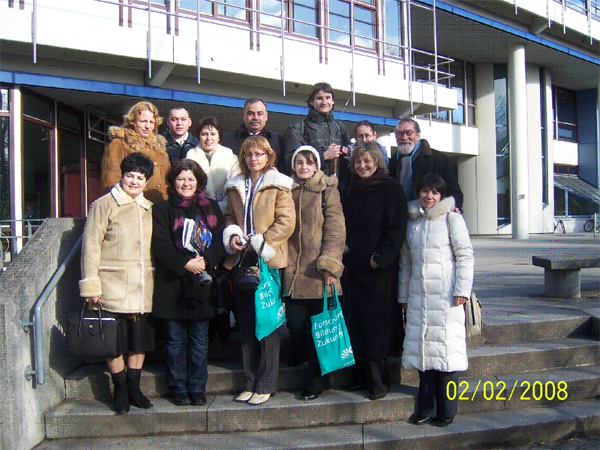
The main purpose of the center in Chisinau is to support visually impaired people in their process of integration into the academic courses and in the University’s environment. This means the creation of adequate conditions to accomplish their study obligations, having assured equal rights between all students. Over 40 persons are actually studying at different faculties in the Republic of Moldova
The Center’s services:
The efficient learning process of a visually impaired student is based in most of the cases on the usage of modern technologies: equipment / peripheral hardware and supporting software.
Modern technologies are employed to transform the literature study into digital format and later into print with a large font or into Braille.
The Center offers to interested students, assistance regarding the choice of an appropriate faculty, putting at their disposal information concerning social and financial issues, study aspects, accommodation possibilities, orientation and mobility trainings and psychological counseling.
During the study period, regular meetings are held with the professors and the assistants, in order to find solutions to current problems.
In April 2009 (14 days), at the State University in Chisinau, a Training Course was held, which had the objective of studying the computer and the neccesary programs for students (trainer Mr. Peter Lecky, University Commenius from Bratislava , Slovakia).
The Blind Union of Moldova (BUM), a non-governmental organization, which was created 63 years ago (1946) has as its main objective, the social protection of people with visual disabilities in the Republic of Moldova. We have identified over 9500 persons with visual disabilities. At this moment, in RM we have 3 specialised schools: the boarding school for blind children from Balti, the technology lyceum from Chisinau and the professional school from Chisinau (professions like secretary or masseur) with a number of 150 pupils in every school.
At the end of 2008 the Association for Visually Impaired Young People was created, which concerned integration in the community, the solution to different problems, participation in conferences and forums, the developing of sports and culture, information and communication
A very important emphasis in the BUM activity is given to the instruction and to the education of the young people with disabilities and of course to the growing of a new healthy generation. BUM in cooperation with the Center for Information and Rehabilitation together with partners from Germany- CBM, Norway-Help Moldova, The Nederland, and our local partners - SOROS-Moldova, the Social Investment Fund from the Republic of Moldova is creating conditions for the successful integration of students into institutions of superior education and High School, contributing to the equipping with different kinds of technical supplies, to the usage of different kinds of special computer programs, mobility programs, communication and information.
Starting in January 2010, the Blind Union of Moldova became a consortium member of a new Tempus project “The centre of continuous development in the field of inclusive education in Moldova - MOLDINCLUD”.
The partners of this project are: Geneva University from Italy, Royal Institute of Technologies from Sweden, Karlsruhe University from Germany and several universities and high schools from the Republic of Moldova. The main “actors” in this project are the Applicant University from Spain and the Institute of continuous development from the Republic of Moldova.
The main objectives of this project are the elaboration of an educational methodological framework, regarding the continuous professional development of teaching staff. Its aim is the creation of a national network for the promotion of inclusive education and its sustainability in all the regions of the Republic of Moldova.
THANKS to everybody for their cooperation.
by Larisa CELAN, Vice-president Blind Union of Moldova, celanlarisa@moldovacc.md
by Elena MENDELOVA, Ph.D, University Commenius, Slovakia, elena.mendelova@fmph.uniba.sk
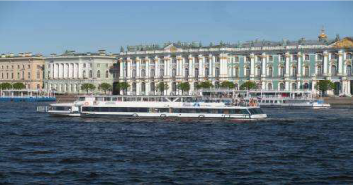
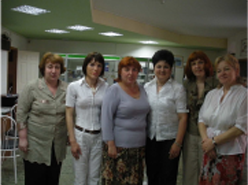
In the period between 23 May – 2 June 2009, specialists from the Blind Union of Moldova undertook an informative meeting at the Socio-medical Centre of Rehabilitation in Saint-Petersburg, Russia. The purpose of the journey lay in an interchange of experiences in the sphere of social rehabilitation for Visually Impaired People (VIP) in all development stages. It also involved getting acquainted with various methods and techniques regarding the means of improving the social protection field in Russia and the St. Petersburg regions, the psychological aids in cases of diabetic retinopathy, contracts and agreements concerning future collaboration in sportive and cultural projects elaboration and implementation, experience interchange and increase of the qualification level (master-class), summer camps, etc.
As some of the specialists from the Republic of Moldova visited the historical centre and the northern capital of Russia, St. Petersburg for the first time, it was commonly agreed that it “is better once to see, then one hundred times to hear”.
The rehabilitation centre from St. Petersburg (manager Mrs. Tamara Velikanova) www.bli.narod.ru has carried out its activities as a state institution since 1999, acquiring ever since a rich experience in the area of elaboration of psychological and pedagogical systems meant to provide rehabilitation for VIP, to facilitate their social inclusion and to preserve, at the same time, the functions of their visual receptors. On the bases of some very complex and successful programs, the visually impaired persons receive, at this Centre, a 2.5 months instruction session in the educational area (orientation and mobility, daily life skills, Braille system reading and writing methods) according to their individual medical diagnosis and visual conditions. This first stage of rehabilitation is followed by a second one, which involves psychological counseling, medical assistance and vocational training preparation (massage, computer courses, handicraft and artisanship). The centre possesses very well-trained specialists in this particular field. Consequently, its activities focus around redressing neuro-psychic functions, improving the quality of people’s lives, reducing solitude and depression, building self-confidence, stimulating interest and curiosity in the surrounding environment, identifying rational means of adaptation of a visually impaired person who became blind during their mature years.
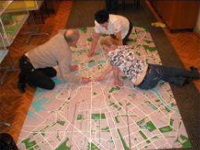
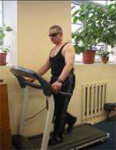
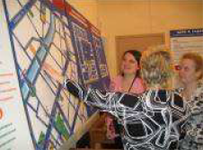
Both the centre’s manager and the staff offered us a warm reception and a special treatment during our stay there, gladly sharing with us their knowledge and experience, providing our participants with didactic materials and introducing amazing visually impaired people who are using the services of the centre.
It is otherwise, worth mentioning the impact made on us by the state’s direct and active contribution to the protection of VIP’s rights of rehabilitation in Russia. According to the Federal and Regional legislation, and particularly due to the Individual Program of Rehabilitation for VIP, each person belonging to this category is provided with all the necessary technical means (glasses, hand glasses, clocks), informational means (recorders and players, mobile phones and computers with licensed assistive software), mobility means (white lightening canes, guide dogs and food for them) etc. In this context someone once said that “it is indeed human the state which is preoccupied with the destiny of its vulnerable citizens.”
By comparison, in the Republic of Moldova a similar Centre for Information and Rehabilitaiton was created in 2006 with the financial support of the state and of the Foundation for Social Investments. The Centre is still at the initial phase of its development, providing social rehabilitation services, special library services, Braille typography and Audio Recording Studio.
In the second and third day of our stay in St. Petersburg we were able to visit the Socio-Consulting Centre “Diabetes” (manager Mrs. Shipulina Marina). The aim of this visit was to gather information regarding the services provided to diabetic patients, and the ways of preventing the blindness in case of diabetic retinopathy.
In the Republic of Moldova, because of the low standard of life conditions and also because of people’s irresponsible attitude towards their health, the phenomenon of blindness becomes very frequent, and the most important thing is that people don’t possess enough knowledge as to how to prevent this tragedy. In this context, the Blind Union of Moldova has the intention to create a “School for Diabetics”, as diabetes is one of the most typical factors causing blindness among mature people.
The next step in our working plan was the visit at the State Library of Blind People from St. Petersburg. Among the 10 types of services bestowed by the library, the one that really impressed us was the Information Centre – a project launched in 1998, which aims to provide services regarding information formatting and access to new information and communication sources. We also saw there, for the first time, tactile books http://gbs.spb.ru.
Other sport-cultural rehabilitation activities are offered to VIP from St. Petersburg by the Centre of Sport-Cultural Rehabilitation and the Entertainment Club A.Şelgunov. In these institutions there operate departments such as the Chorus of the veterans, sportive dances, the theatre of the word, vocal interpretation, English language training courses, the theatre of Youth, a clay building workshop, sports (swimming, judo, light athletics, alpine ski, tandem-bicycle), the association of young poets and finally computer training courses. http://spb.ro.vos
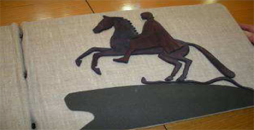
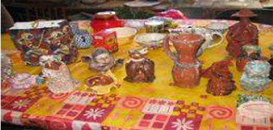
We were offered the possibility of visiting the Museum of the Regional department of the Blind Union from St. Petersburg, which celebrates its 85th anniversary this year. We were really touched to see the workshop of artisan works manufactured by partially sighted and totally blind people.
It is not to be disregarded the wonderful cultural program which we could enjoy in St. Petersburg: an organ concert at the Philharmonic Theatre in the name of D.D.Şostakovici, accompanied by the Switzerland singer Felix Pahlatko and the play “A night before Christmas” performed at the Great Dramatic Theatre „G.Tovstonogov”. A profound impression produced on us the celebration the 306th anniversary of St. Petersburg city and, evidently the white summer nights.
The advantages of this informative visit are under any discussion great. We got acquainted with a huge and complex instructive mechanism of support for visually impaired people, in order to contribute to their efficient social inclusion.
Applying this experience we intend to launch at the Centre of Rehabilitation from Moldova such mechanism of development as: programs and working means adaptation to a standard level, continuous preparation of the specialists in this field, determination of legislative principles, establishment of concrete responsibilities for the sides involved in the process, qualified instruction, social inclusion and vocational training for VIP, internal and external financing programs meant to accomplish all the previously settled objectives and tasks.
At the end we would like to express our sincere gratitude to the partners of the two countries for the efforts realized in order to accomplish this travel, particularly to Mrs. Lilyia Plastunova, representative of the sub-region East European countries in ICEVI, St. Petersburg Regional Children's Hospital, Eye Microsurgery Department.
Elaborated by:
Larisa Celan - celanlarisa@mcc.md,
Vice-president of the Blind Union of Moldova, ICEVI contact person in Moldova
Lilya Plastunova - plastunova@yandex.ru,
Representative of ICEVI in the East-European Region
The Nordic Music Camp was held for the first time in November 2009 in Copenhagen at The Institute for The Blind and Visually Impaired in cooperation with Arla Institute, Helsinki, Huseby Competence Centre, Oslo and The Resource Centre Sight, Stockholm.
The four participating countries are members of The Nordic Music Profile Group that works towards developing the music pedagogical teaching with visually impaired people in the Nordic countries, enhancing them on equal terms as normal sighted people to educate and work within the music field.
The Nordic Music Camp was an offer to music students and music interested young people at the age of 16 to 32 with a visual impairment to meet, connect and see new possibilities within education and working opportunities.
The purpose of the The Nordic Music Camp was divided into three categories
The Nordic Music Camp was a big success.
In three intensive day our coaches worked with the young voices and bodies in music. Two music numbers were played and recorded in the studio.
The musical part of the music camp ended up with a little concert at IBOS and was recorded by the Danish Television.
Listen to the two studio recorded numbers at http://www.ibos.dk/
For more information, contact Lisbeth N lnw@ibos.dk
The Visual Impairment Knowledge Centre in Denmark has a small collection of publications in English that might be of interest for persons working in the area of education. All publications are free of charge and available in print or as MS Word or PDF files.
Orientation & mobility: The DVD and booklet "Walking together. A collaboration between a visually impaired person and a sighted guide” give an introduction to sighted guide techniques helpful for persons with a visual impairment and their family, friends and co-workers. The booklet (21 pages) is available in Danish, English and Arabic. The DVD, which contains a 12-minute instructional film is available in Danish and English.
(Author of the booklet is O&M instructor Lisbeth Hallestad, the Institute for the Blind and Partially Sighted. The film was made by the Institute for the Visually Impaired, the County of Northern Jutland.)
Audio-training: "Audio-training for visually impaired learners” (8 pages) describes an auditory training programme aimed at O&M instructors. The programme seeks to make students aware of sounds as natural cues.
(Author: Inge Bager, the Institute for the Blind and Partially Sighted)
Student projects: We have a collection of student project papers made by students from WPI, Worchester Polytechnic Institute in the USA in collaboration with the Visual Impairment Knowledge Centre. The papers deal with the following topics: toys and games, physical education, science experiments, roundabout intersection accessibility and the use of RFID chips for indoor labeling. For additional information or to order a copy, please contact the Visual Impairment Knowledge Centre: visinfo@visinfo.dk or telephone: +45 39 46 01 01
About us: Brief presentation of the VIKC in English: http://www.visinfo.dk/Presentation%20in%20English.aspx
Low Vision Toolkit - supporting pupils with Low Vision. This resource, written by Nathan Davies, is a comprehensive training programme to teach pupils with low vision how to make the most of their sight and how to use their low vision aids correctly and confidently. It consists of seven individual modules that can be used either on their own or together to form a complete training programme for pupils with low vision. The seven modules are:
Each module contains learning objectives, background information for the professional using the toolkit, photocopiable resource sheets relevant to children and young people of all ages and assessment sheets to be used by pupil and teacher.
This exciting new resource is available in English and Welsh languages from the RNIB On-line Shop (www.rnib.org.uk) at £29.99.
'What Can You See?' - Supporting the social development of young people who are blind or partially sighted.
This exciting new resource for all professionals involved in supporting the social needs of blind and partially sighted learners has been produced by RNIB Cymru. Written by Gail Bailey, an educational psychologist with extensive experience of working with children with visual impairment, it aims to equip children and young people to respond to the question 'What can you see?' in a way that is helpful to themselves and to others.
Essential reading for teachers, leaders of children's after school activities, co-ordinators of social and emotional learning, educational psychologists and sensory support services, this book improves understanding of the true impact of sight loss for young people. It explores and supports the challenges to their social development and well-being and uses case examples to illustrate how this can be done. Practical, fun, workshop resources to educate the peer-group are included as part of the resource.
What Can You See? is available from the RNIB ON-line Shop (www.rnib.org.uk) at £12.50
Nicola Crews, RNIB (Cymru) Wales
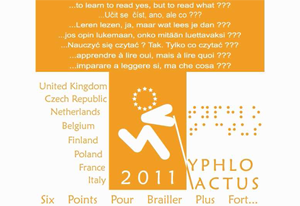
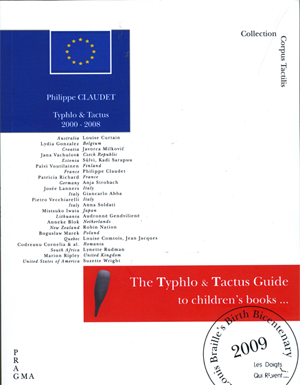
In November 2011 the Tactus Competition for the Award for the best tactile book for blind and visually impaired children will take place. It will be open to all countries in the world.
The members of the Tactus group (Belgium, France, Finland, Italy, The Netherlands, Poland, and United Kingdom), invite you to create your own tactile illustrated book with Braille.
More details and information about Typhlo & Tactus will follow in the next issue of the ICEVI newsletter.
Information & contact about Typhlo & Tactus :
Philippe Claudet
Les Doigts Qui Rêvent (Charity)
11 bis rue de Novalles, BP 93
F-21240 TA LANT (Dijon)
philippe.claudet@wanadoo.fr
T : 0033 3 80 59 22 88
www.Ldqr.org and www.tactus.org
19 countries
23 contributors
400 pages (16x21cm)
Available:
We are very pleased to announce that the third ECPVI conference will take place in Vilnius, Lithuania on the 30th and 31st of March 2010. The number of participants is limited to 120.
The plenary program will consists of a number of keynote speakers from the University of Vilnius and the Lithuanian Association of the Blind and Visually Handicapped, among others.
The sessions on day one will cover different age groups:
The sessions on day two will cover topics like:
We would very much encourage the participants to share their work at this conference. It could be in the shape of presentation of new ideas, research findings, showing assessments, giving lectures or just asking for partners in new projects.
If you want to do this, please send a short “abstract” on the idea and the theme. The overall meaning for the conference is to exchange and reflect upon psychology and visual impairment. So do not send a formal abstract like the more formal conferences, but just as a piece of information, so the planners can get an idea of what you want present.
The host of the conference will be the Lithuanian Training Centre for the Blind and Visually Impaired in corporation with ICEVI-Europe. An associated partner will be Lithuanian Association of the Blind and Visually Handicapped.
Conference location: Lithuanian Training Centre for the Blind and Visually Impaired.
Address: Ateities str. 44, LT-08303, Vilnius, Lithuania.
The Centre provides early intervention, preschool and secondary education for visually impaired children, education for deafblind children. It also provides support for mainstreamed visually impaired students, their families and teachers, rehabilitation services (O&M, Braille literacy, daily living skills training). The Centre is about 8 km from Vilnius city center.
To register, please send following information to Ingrida Gabrialaviciute by e-mail ingrida@lasuc.lt
This conference will emphasise multimodal learning processes in general, but focus in particular on those including blind persons. The conference aims at bringing research from various fields together, to build networks for further research in relation to blindness, and to stimulate practitioners, such as teachers, to deepen their knowledge. And we hope to encourage a great deal of academic and professional matchmaking.
The target-group for the conference consists of scholars, students, teachers working with blind children, and other interested parties.
The conference will be held at Mälardalen University in Eskilstuna, Sweden, at the School of Innovation, Design and Engineering (IDT).
More information at http://www.mdh.se/idt/multimodal
The third International Festival for handicapped children. “The Step Towards!”
April 18 – 24, 2010 St. Petersburg, Russia
www.feststep.com
Teacher Training Conference in preparation for early spring 2011 in Graz, Austria
Information: chairman Hans Welling hw@icevi-europe.org